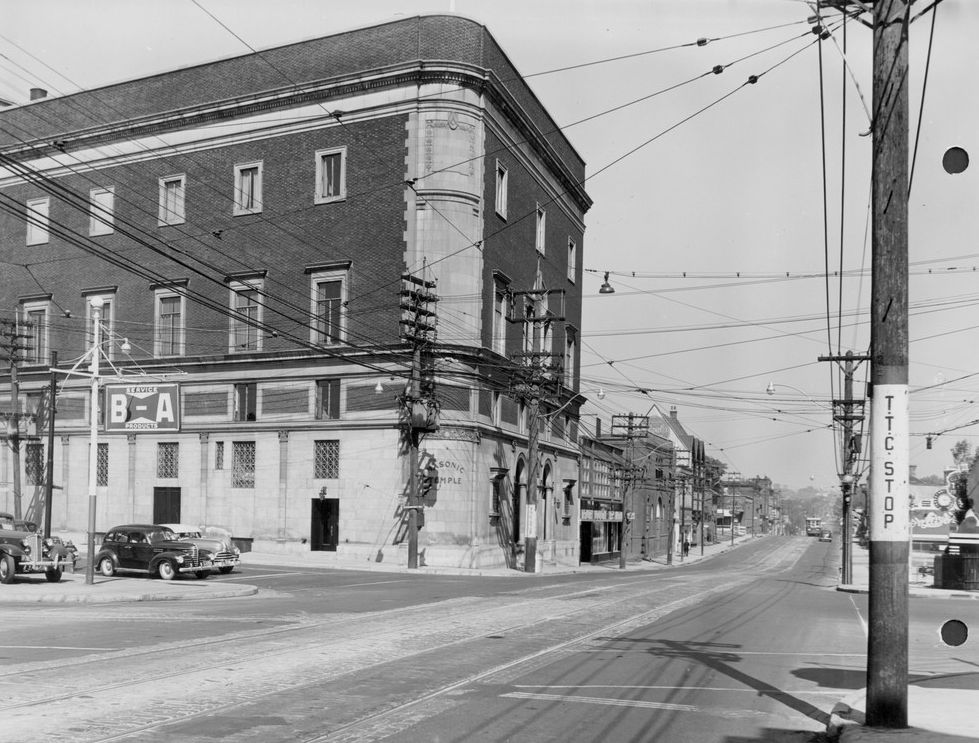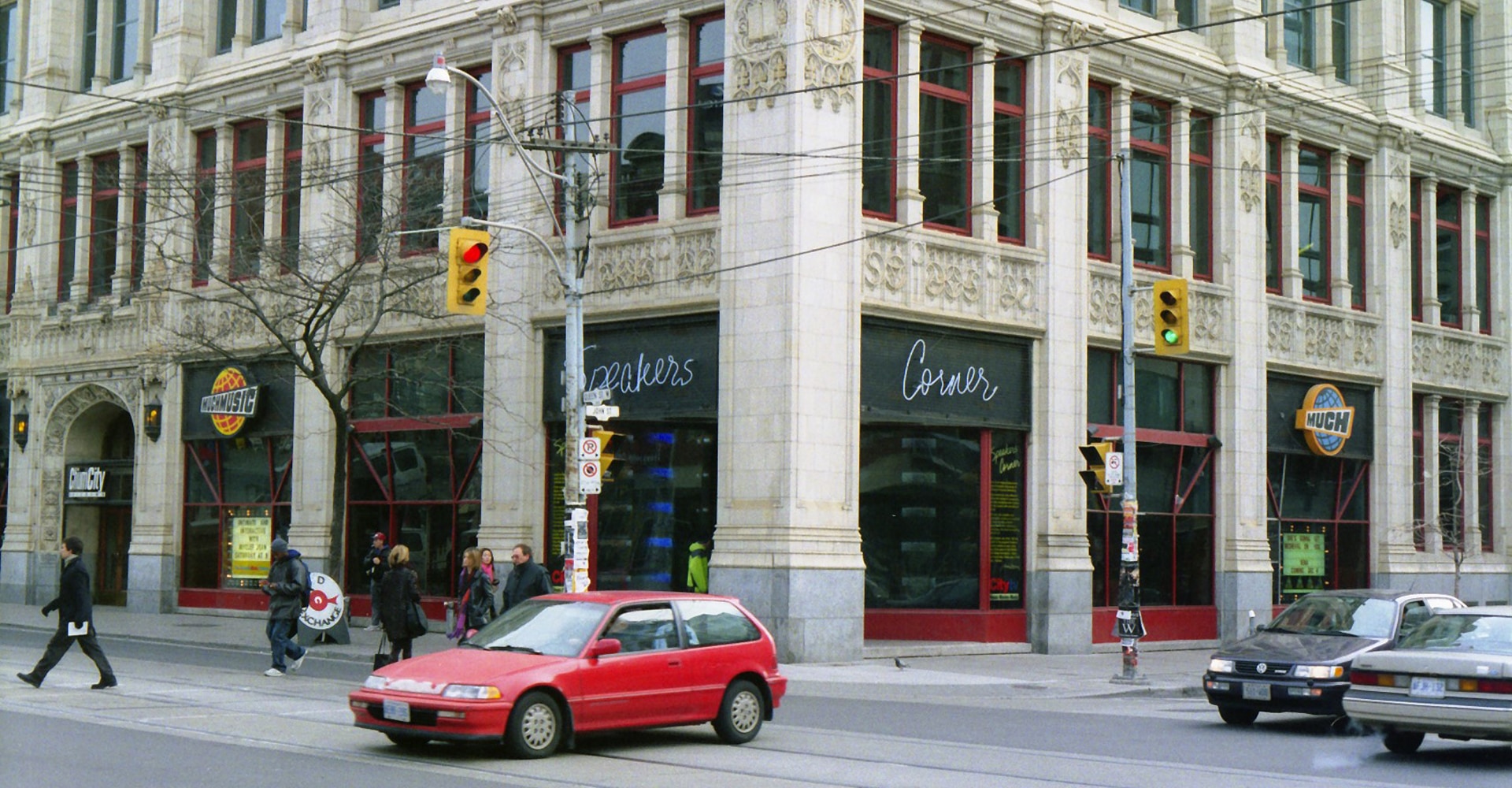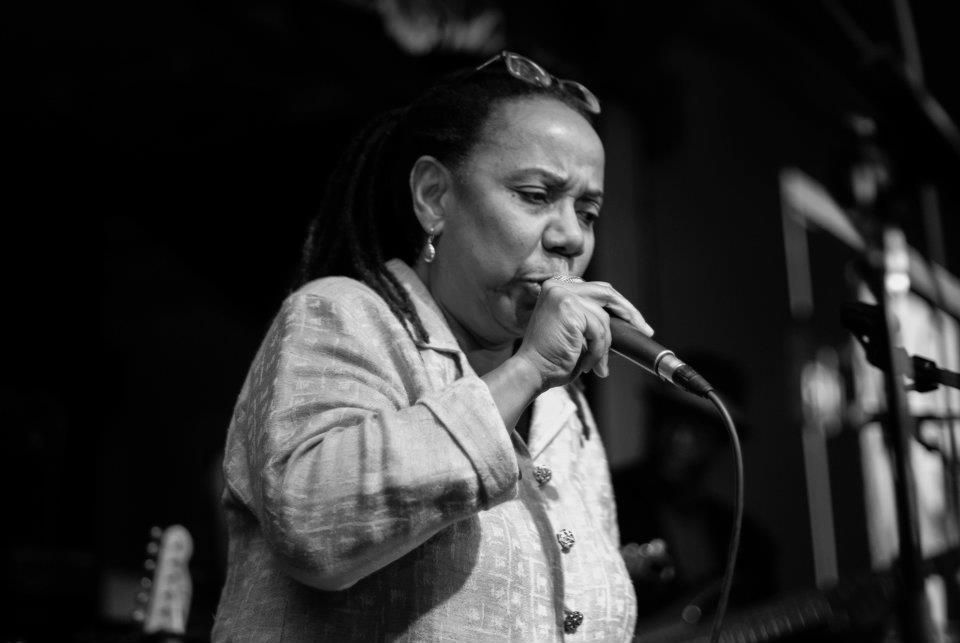
Standing on the stage at the Concert Hall, Michie Mee looked out at the crowd. The female MC was about to battle, representing Toronto’s hip hop scene against New York City’s.
Her crews were all there. Friends from school and from different areas of the city waited in anticipation: Scarborough, Jane and Finch, Flemingdon Park, Regent Park.
That night, March 14, 1987, was about to go down in history as the Ultimate Hip Hop Battle. Michie won over the crowd and the critics with her own Jamaican-Canadian style. Mixing dancehall, reggae, and hip hop, she trailblazed her way to become the Queen of Hip Hop.
A Young Rapper
Born in 1970 in Jamaica, Michelle McCullock (aka Michie Mee) moved to Toronto at the age of six. Growing up in the Jane and Finch neighbourhood, McCullock’s mother introduced her to “Rapper’s Delight” by the Sugar Hill Gang, often considered to be one of the first widely successful rap songs, introducing international audiences to the musical form.
McCullock also found inspiration locally. Thanks to a visit from dub poet, educator, and fellow-Jamaican Lillian Allen to her Toronto school, McCullock saw strong Black women deftly weave words and rhythms in front of rapt audiences.
This online exhibition uses third-party applications including Spotify and YouTube. Check with your organization’s web administrator if you are unable to access content from these channels in the exhibition.
Listen: Rapper's Delight
Listen to this ground-breaking hip hop track by the Sugarhill Gang, released in 1979. The track had a profound influence on a young Michelle McCullock (aka Michie Mee), inspiring her to write and perform as a hip hop artist.
Although the Sugarhill Gang were all from Englewood, New Jersey in the United States, the track only reached the Top 40 on the US music charts.
Meanwhile, in Canada, the track was a number-one hit.
Born To Rap
For Michelle McCullock, rap was love at first listen. By the time she was 13 years old, knew she wanted to be a rapper. Mixing a perfect blend of dancehall reggae, hip hop, and a linguistic blend of Jamaican Patois and everyday English, McCullock showcased her growing skills at her school’s variety shows, performing under her stage name, Michie Mee.
On a visit to New York City, performing alongside rappers twice her age, Michie Mee impressed DJ Scott La Rock from Boogie Down Productions. She was signed to the First Priority Records label soon after, making Michie Mee the first Canadian rapper to sign in the United States.
Michie was an inspiration to other Canadian rappers such as Maestro Fresh Wes, who topped the rap charts with his 1989 hit “Let Your Backbone Slide.” Maestro Fresh Wes had launched his Toronto music career with performances at The Concert Hall, a hub of hip hop in the city during the 1980s and 1990s.
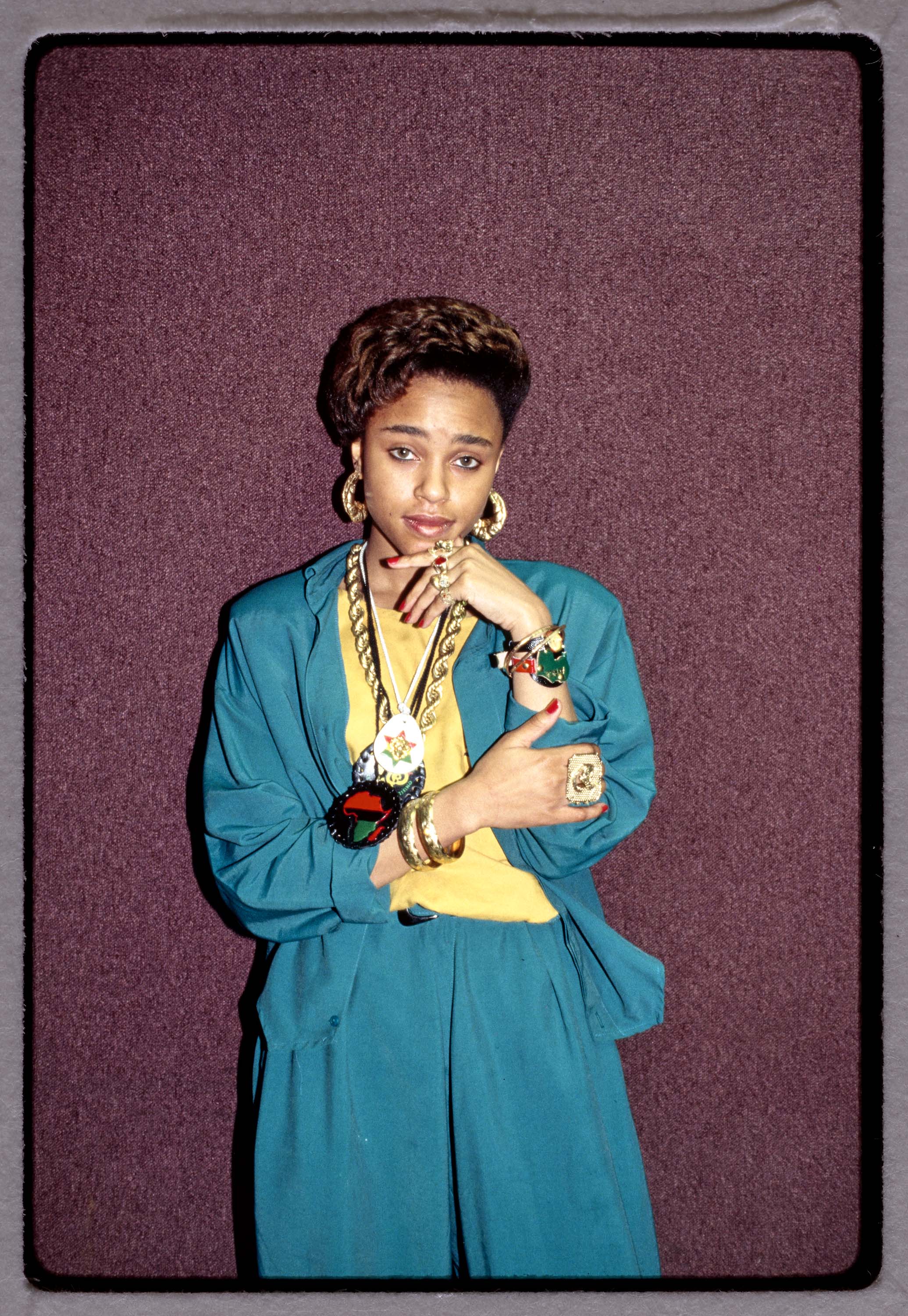
A young Michelle McCullock (aka Michie Mee) after spitting down lyrics at Latin Quarters nightclub in New York City in the 1980s.
Photo by Ernie Paniccioli
The Hubs of Hip Hop
Today, you can instantly play the latest Canadian hip hop track with the swipe of a finger on your smartphone, pulling up artists like Drake or The Weeknd instantly.
During the early 1980s, Canadian hip hop was created in suburban basements, schools, and community halls. Recordings of your favourite artists could be hard to find. That’s where the local radio station stepped in.
By the mid-1980s, DJs on Toronto’s local radio station CKLN-FM, 88.1, began to include rap artists as part of their regular playlists. DJ Ron Nelson, aka “Master Mix Ron”, hosted the radio’s weekly hip hop show Fantastic Voyage, introducing Toronto listeners to new rap artists, like Michie Mee and Maestro Fresh Wes.
CKLN’s music influence wasn’t limited just to rap. Queen Street West’s The BamBoo also worked hand in hand with CKLN to promote the African and Caribbean music scene in Toronto during the 1980s.
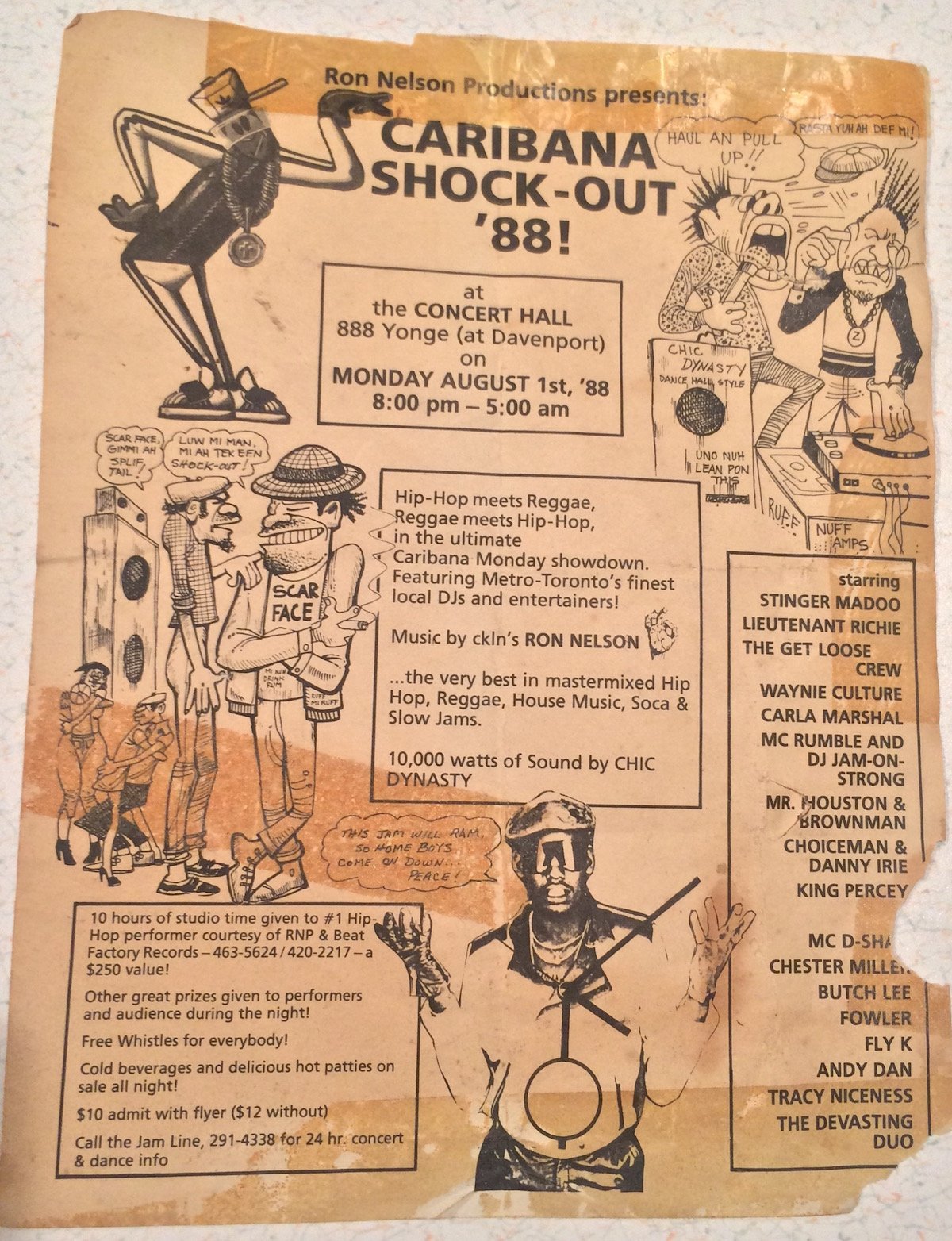
Ron Nelson, aka Master Mix Ron, was a radio dj for local Toronto radio station, CKLN-FM. One of the first major promoters of rap in Toronto, Nelson spearheaded rap performances in Toronto, organizing several concerts and festivals for hip hop, often at the Concert Hall.
Courtesy of Jonathan Ramos
The Concert Hall
With only a few rap records on music store shelves, local radio stations also helped organize live performances for rap artists. DJ Ron Nelson organized the first large-scale rap concerts in Toronto, encouraging US rap artists to perform alongside Toronto’s rap stars like Michie Mee.
The Concert Hall soon became the centre of Toronto’s hip hop scene, a space where the underground hip hop movement and artists could perform regularly, testing out new techniques and challenging each other to keep improving, finding better rhymes and better beats.
If the Concert Hall was a girl, it'd be the matriarch of our scene, of our family.
—Michie Mee, NOW Magazine, 2017
Where else were you going to get 2,000 people – the entire hip-hop community – screaming, yelling and dancing at your act because they were there with Biz Markie, Scott La Rock and KRS-One or Public Enemy. As a platform, [the Concert Hall] was massive.
— Ivan Berry, manager/cofounder Beat Factory Records, NOW Magazine, 2017
The Ultimate Hip Hop Battle
Rap battles were classic elements of 1980s hip hop concerts. Pitted against each other on stage, rappers recited or freestyled short performances, daring their opponent to come up with better, faster, or more cutting rhymes.
Concert audiences were often judge and jury in rap battles: making as much noise as possible to support the rapper who impressed them the most.
DJ Ron Nelson organized several rap battles at the Concert Hall during the 1980s, but one of the most enduring remains the 1987 battle which pitted the infamous New York City rap scene against Toronto’s own rap stars.
Michie Mee, one of the most recognizable Canadian rap artists, stepped onto the Concert Hall stage to battle the infamous Brooklyn MC, Sugar Love.
Michie’s distinctive Jamaican-Canadian style shut the New York City rapper down.
That was the one [battle] where I said. ‘You’re American? Eh, gyal I’m a Jamaican’ and the Concert Hall [crowd] didn’t let me finish the rest.
—Michie Mee, Interview with Vice, 2015
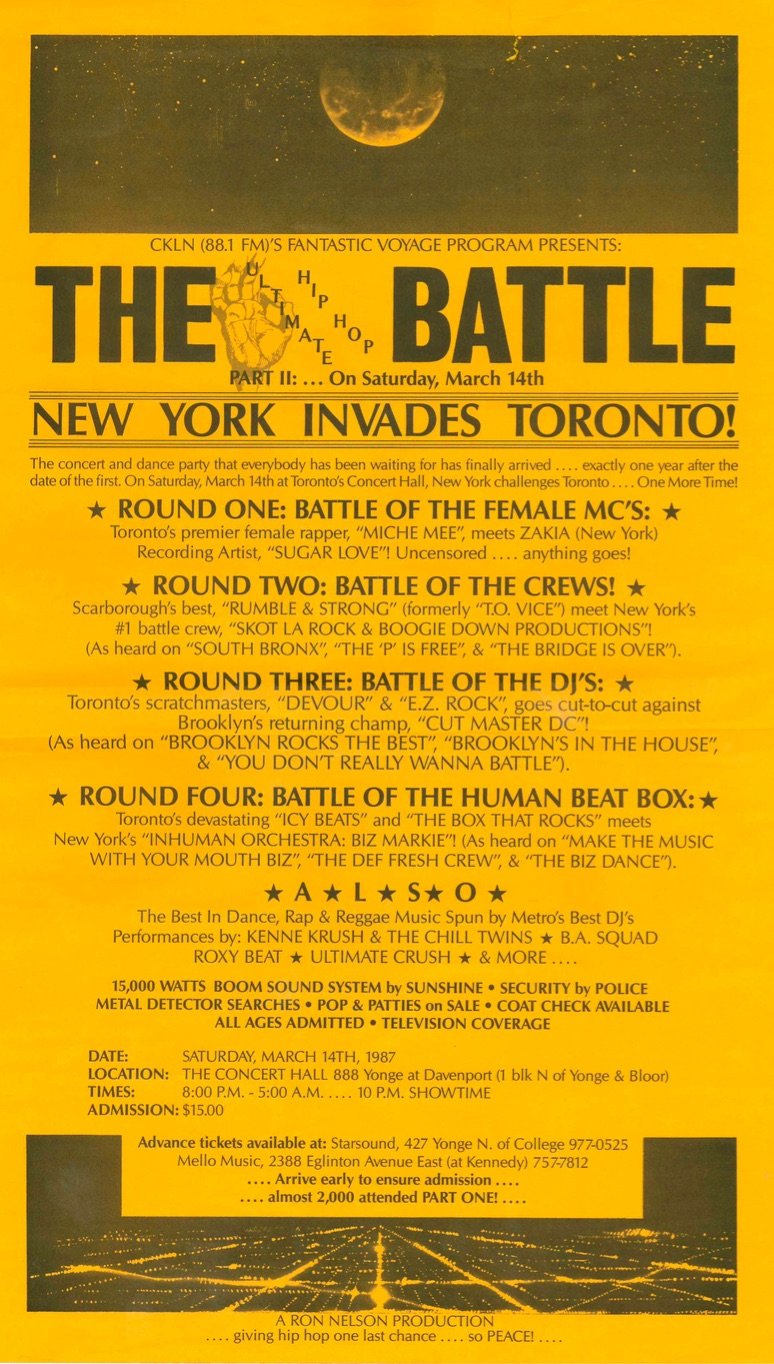
A poster for The Battle, organized by DJ Ron Nelson for the Concert Hall on March 14, 1987
Courtesy of Johnathon Ramos
Watch: A Hip Hop Battle To Remember
The Concert Hall at 888 Yonge Street was the site of the famous 1987 rap battle where Michie Mee showcased the strength of Toronto's hip hop scene against that of New York's.
"Winning at the Concert Hall really let them know I could battle any American. It let them know I’m Jamaican and I’m Canadian. There was nothing to fear. And female artists are here to stay – all from that one show." —Michie Mee, interview with Now Magazine, 2017
This online exhibition uses third-party applications including Spotify and YouTube. Check with your organization’s web administrator if you are unable to access content from these channels in the exhibition.

Watch Michie Mee return to the Concert Hall to remember the night she represented Toronto in the ultimate hip hop battle. Video directed and produced by Blake Hannahson for Heritage Toronto.
View TranscriptMichie Mee: The Toronto community of music is amazing. There’s just a multitude of music that you can just dip into.
The Concert Hall was the place. Everywhere that was on the outskirts of Toronto, Kingston, Oshawa, would just be one big Canadian room full of artists that wanted to be part of the whole American culture at the time.
I mean, it was new worldwide. It was changing so rapidly, every corner had their own slang or accent or something that they would interject into the lyrics. If you made it to the Concert Hall, if you made it on that stage, if the audience just cheered for you, the Concert Hall was the place that you made your name.
This is it.
I remember winning. I remember not being sure and not being confident prior and then getting in the room and just going for it. I remember there was a lot of Americans in here, there was a lot of schoolmates in here. There is hip hop in Toronto. And this is what really made me an international artist, was this night right here at The Concert Hall.
I didn’t really know that I was representing man or woman, I was representing the genre and wanted to prove that it wasn’t disco, it wasn’t going anywhere. It was challenging. It was cool as shit!
Jane and Finch, Regent, Flemo!
I’ve gotten support from television, radio, friends, family, my grandmother! Yeah, my biggest fan. My son. It’s very hard to the entire journey yourself. I’ve gotten a lot of support and that’s kind of what keeps me going. I’ve let it go and it doesn’t leave you.
When we did our set, the reggae would be so prominent you could hear the transition even louder through the system. You’d feel that the reggae bass was different than hip-hop. It added another layer. So I was a female rapper, number one, and then here we were with this reggae bass. The show was always full of energy.
— Michie Mee, Now Magazine, 2017
A MC Sisterhood
Throughout her career, Michie Mee emphasized the need to have more women in the hip hop space. As one of the rising stars in the hip hop space, Michie featured in the 1989 music video “Ladies First”, a track off of Queem Latifah's debut studio album All Hail the Queen. The song remains one of the most powerful hip hop anthems for women.
Michie has continued to encourage a sisterhood among women in hip hop. Having held her own in a predominantly male performance space and industry, Michie reminds us to look for the female artists, and especially Black female artists, to help give them the spotlight.
Who said the ladies couldn't make it, you must be blind
—Queen Latifah, "Ladies First", 1989
If you don't believe, well here, listen to this rhyme
Ladies first, there's no time to rehearse
I'm divine and my mind expands throughout the universe
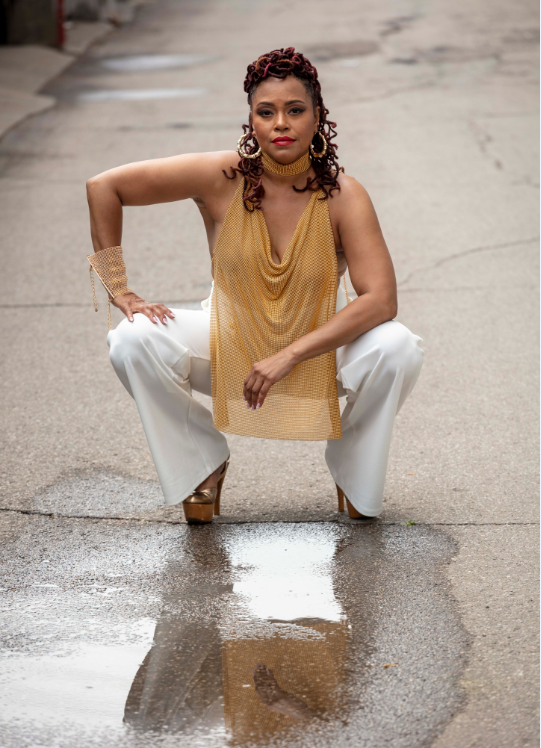
Photo by Steve Carty
Watch:
Jamaican Funk-Canadian Style
Scott La Rock produced Michie Mee’s first single “Elements of Style”, released in 1985. Nevertheless, it was her first full-length album Jamaican Funk - Canadian Style (1991), that caught the attention of Canadians and garnered her a JUNO Award nomination for Best Rap Recording in 1992.
This online exhibition uses third-party applications including Spotify and YouTube. Check with your organization’s web administrator if you are unable to access content from these channels in the exhibition.

Watch Michie Mee discuss the filming of the music video for the title track from her 1991 album, “Jamaican Funk - Canadian Style”. Courtesy of Retrontario. Please note: This third party video does not provide closed captions.
View TranscriptMale Voice: Kick it.
Michie Mee: It stands for being a strong woman. I didn't get the opportunity to do the first song, “Ladies First”, which we have glad to be, and they brought me up for that.
Um, but it's portraying the same thing, strong women, and we're doing the Women in Rap tour for the time being, so I’d also like to also promote that, but basically just being a strong woman and portraying it in the video.
But in the same way, we're trying to keep our sex appeal. We don't have to portray men and imitate being men. I don't think that's really necessary.
We’re strong women.
Male Voice: Standby. And roll audio
Background Chorus: Where all your money at. Break your heart.
Michie Mee [rapping]: I’m a Jamaican, taking charge and living large. A big time. Comin up, I just barge in your area. Breakin the barrier, makin’ it merrier. You cheer me when you hear me and boost your stereo up.
When I arrive, I start smoking, the mic is hot and locked. It’s a shame there’s not a damn night like it when Michie’s on this mic. It’s not for niceness.
Michie Mee [talking]: We've heard Baby Face sing about the Whip Appeal. Well, this my version of the Caribbean Whip Appeal which is called the Jamaican Funk. It’s a very sexy, chic, crossed over into the Jamaican reggae dance hall style, and also into the rap world. So stay tuned for more.
Michie Mee: [Rapping in Patois]
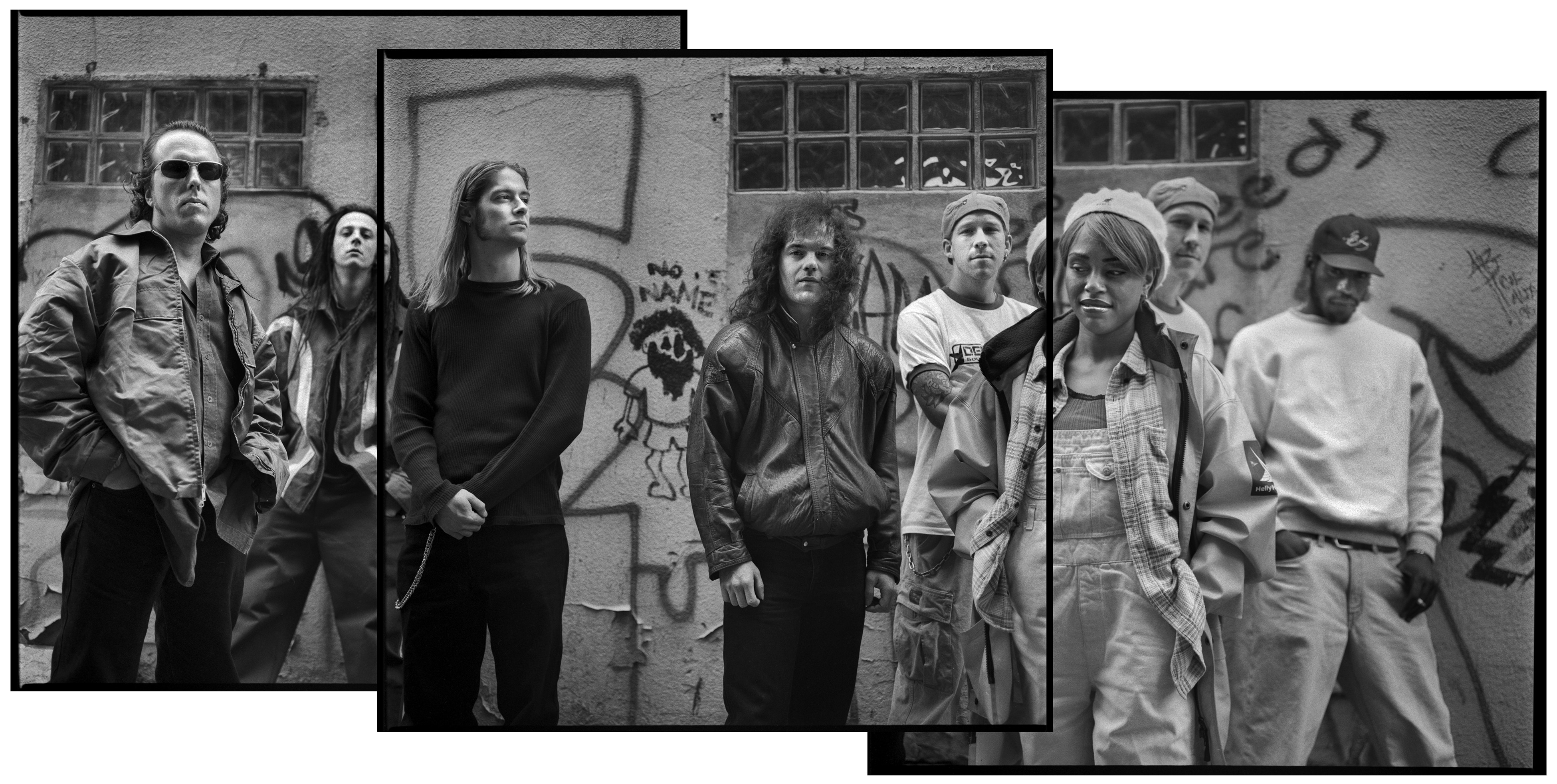
During the mid-1990s, Michie Mee was part of the Toronto-based hip hop group Raggadeath. The group blended rap, hip hop, metal with reggae and ambient techno music creating an ecocosm of sound parallelling the band’s members as well as the diversity of Toronto’s people and sounds. Active between 1995 and 1997, the group’s biggest hit was “One Life to Live” (1995).
Photo by Rick McGinnis, 1997.
Watch: Don't Wanna Be Your Slave
Returning to work as a solo artist, Michie Mee self-produced and released “Don’t Wanna be Your Slave” in 1999. The song was nominated for Best Rap Recording in 2000, Michie Mee’s third JUNO Award nomination.
This online exhibition uses third-party applications including Spotify and YouTube. Check with your organization’s web administrator if you are unable to access content from these channels in the exhibition.

Watch the music video for Michie Mee’s 1999 track “Don’t Wanna be Your Slave” featuring Esthero. Courtesy of Michie Mee. Please note: This third party video does not provide closed captions.
View Transcript[Michie Mee]
Uh ..uh turn me up
Wanna hear the music
Yeah
Wanna feel that vibe
Turn it up
Are we on the air?
Uh huh
Ya didn't hear?
We all over the world, babe
Gotta make that money, man
Do this child
Make your money, dawg
Do it child
Just to whatcha got to do
[Esthero]
Do it and do it and do it and do it and do it
Don't wanna be your slave
[Michie Mee]
And I'm not gon' cry victim
And I'm not gon' blame the system (Esthero: don't wanna be your-)
[Esthero]
Do it and do it and do it and do it and do it
Don't wanna be your slave
[Michie Mee]
And I'm not gon' cry victim
And I'm not gon' blame the system
(Esthero: don't wanna be your-)
In life the thing to do
Nothin gained, nothing tried
Very few even try
Most just wanna get high
From the cradle to the grave
Don't wanna be your slave
And I'm not gonna
Take it how you wanna
Love me or hate me
Support me or snake me
Either way I show love
Let it make me or break me
I'm the queen of self-esteem
No sweat the cream
Set the scene
Like how you need
Straight up
Ain't no puppet on a string
Like them hoes suckin on your thing
Overworked and underpaid for days
Behave
I'm not gonna be your slave
[Esthero]
Do it and do it and do it and do it and do it
Don't wanna be your slave
[Michie Mee]
And I'm not gon' cry victim
And I'm not gon' blame the system
(Esthero : don't wanna be your-)
[Esthero]
Do it and do it and do it and do it and do it
Don't wanna be your slave
[Michie Mee]
And I'm not gon' cry, cry victim
And I'm not gon' blame the system
(Esthero: don't wanna be your-)
Hold on tight, don't let go
Don't want much, just want more
Speakin from my people
Scream it hardcore
Livin in the ghetto
Sleepin on the floor
What you thought, I wasn't gonna ride?
Do my thing, get a piece of the pie?
You be holding your breath for great God out the sky
Ya best slit your life cause you're just waitin' to die
People still takin life for a joke
Can't see the fight but you blow a lotta smoke
If you didn't get it, you got what you deserve
Just like that, that's my word
Every day I wake up, scheming on the come up
No day-dreaming, gots to stay one-up
How you gon' sit back and wait on the wealth?
Ya gotta go get it motivate yourself
If not, you're only perpetratin yourself
And at the end of the day, you only hate yourself
If you know me, you know my motto
Takin charge
I got what it takes to make it, make it large
Do it and do it and do it and do it and do it
Don't wanna be your slave
And I'm not gon' cry victim
And I'm not gon' blame the system (don't wanna be your-)
Do it and do it and do it and do it and do it
Don't wanna be your slave
And I'm not gon' cry victim
And I'm not gon' blame the system (don't wanna be your-)
Everybody got a problem
But of course, the world gotta problem
And it's yours
That's why I wrote this rhyme
You can quote this line
Cause I focus line
Livin in some hopeless times, or so it seems
Never let go of your dreams
N'a mean?
N'a mean? (jus do whatcha got to do)
[Esthero]
Do it and do it and do it and do it and do it
Don't wanna be your slave
[Michie Mee]
And I'm not gon' cry victim
And I'm not gon' blame the system (esthero: don't wanna be your-)
[Esthero]
Do it and do it and do it and do it and do it
Don't wanna be your slave
[Michie Mee]
And I'm not gon' cry victim
And I'm not gon' blame the system (esthero: don't wanna be your-)
(4x...to fade out)

Photograph by Denise Grant, 2014. Courtesy of Michie Mee.
Champion and Role Model
As a champion for female artists, especially rap artists, Michie continues to inspire young women by working as an advocate and mentor. She collaborates with local organizations such as Honey Jam, a Toronto-based organization that mentors and promotes young Canadian female artists.
Michie continues to host MC performances and visits local Toronto schools to inspire young women to pursue their personal and professional goals.
Dive Deeper
Contemporary Musical Expressions in Canada. Edited by Anna Hoefnagels, Judith Klassen, Sherry Johnson. Toronto: McGill/Queen’s, 2019.
Kathy Iandoli. God Save the Queens: The Essential History of Women in Hip Hop. New York: Dey Street Books, 2019.

